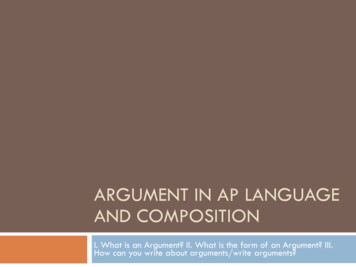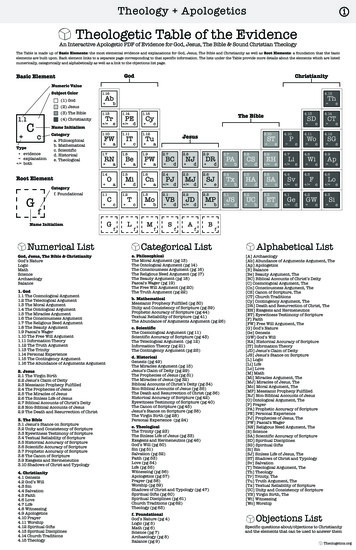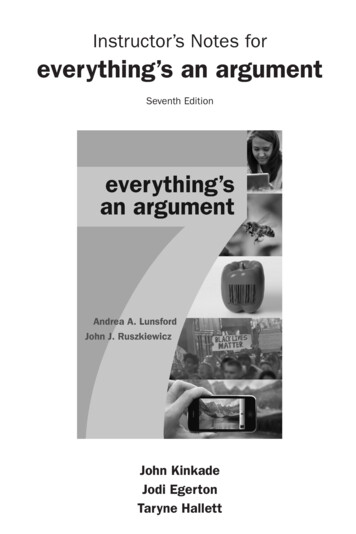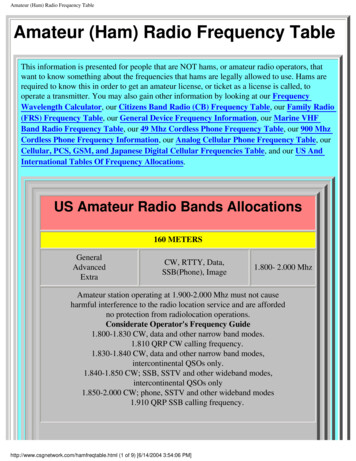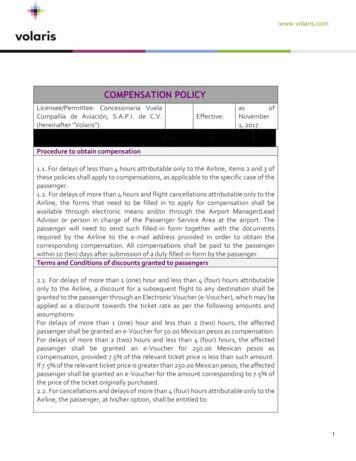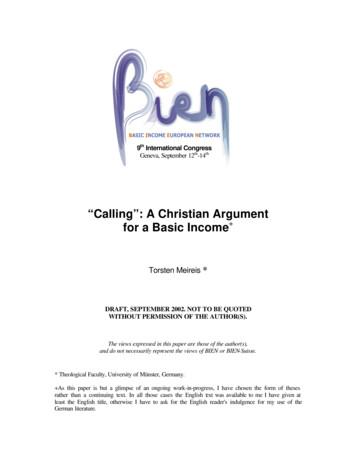
Transcription
9th International CongressGeneva, September 12th-14th“Calling”: A Christian Argumentfor a Basic Income Torsten Meireis *DRAFT, SEPTEMBER 2002. NOT TO BE QUOTEDWITHOUT PERMISSION OF THE AUTHOR(S).The views expressed in this paper are those of the author(s),and do not necessarily represent the views of BIEN or BIEN-Suisse.* Theological Faculty, University of Münster, Germany. As this paper is but a glimpse of an ongoing work-in-progress, I have chosen the form of thesesrather than a continuing text. In all those cases the English text was available to me I have given atleast the English title, otherwise I have to ask for the English reader's indulgence for my use of theGerman literature.
ContentsSummary.v1.Introduction.12.Calling, office and status - Luther's ethical thought in context .23.Reception as interpretation .84.A heuristic concept of 'work' .125.“Calling” as motivating a Christian argument for a basic income .16Bibliographical references.21iii
SummaryThis paper outlines the preliminaries of a theological (Protestant Christian) argumentfor a basic income at the level of a decent minimum. It argues, that the idea of 'vocation'or 'calling' (German: Beruf) developed by Luther and accepted by Calvin and theProtestant tradition can and should be reformulated under the conditions of currentmodernity as a critical term aiming at clarifying what Christians understand as a goodlife. To decide whether an activity is rightly understood as part of a vocation, Luthersketches two main criteria: the activity has to imply a service to one's neighbour and ithas to be done in a spirit of love. A vocation in that sense and under modern conditions,however, can not simply be identified with paid labour, evidently transcends the range ofgainful employment in a capitalist environment and thus can be understood to imply abasic income that makes it possible to follow that calling.v
1.IntroductionThis paper outlines the preliminaries of a theological (Protestant Christian)argument for a basic income at the level of a decent minimum. It argues that theidea of “vocation” or “calling” (German: Beruf), developed by Luther andaccepted by Calvin1 and the Protestant tradition, can and should be reformulatedunder the conditions of current modernity as a critical term aiming at clarifyingwhat Christians understand as a good life.To decide whether an activity is rightly understood as part of a vocation,Luther sketches two main criteria: the activity has to imply a service to one'sneighbour and it has to be done in a spirit of love. A vocation in that sense andunder modern conditions, however, cannot simply be identified with paid labour,evidently transcends the range of gainful employment in a capitalist environmentand thus can be understood to imply a basic income that makes it possible tofollow that calling.As Protestantism seems to be - at least according to Max Weber2 - partlyresponsible for the development that led to modern capitalism and thephenomenon of the “labour-society”, the dramatical changes of which form one ofthe more important backdrops for the debates focusing on basic income, it mightbe of interest to take a glimpse at the line of thought and the debates going on inthat particular community - even for non-Christians. Since Martin Luther's ideason work, expressed in the ideas of “calling” and “station”, stand at the beginningof that process, have had a tremendous impact not only in Lutheran tradition andare of systematic relevancy for Christianity still, they are worth a closer look.To this end, four steps shall be taken. First of all, Luther's ethical thought inits social and historical context has to be briefly sketched. Second, I would like toreflect on the history of the reception of those ideas - it will show, that Luther’sconcept have been perceived out of their social and historical context, resulting in1Cf. Calvin, 1559, 467ff, see also Biéler, 1959, 397ff.2Cf. Weber, 1905 .1
serious misrepresentations. As a third step, a heuristic concept of “work” shall beexpounded: This is necessary to avoid such misrepresentation and to bridge thegap between theological insights won in a stratified, feudal society largely basedon agriculture and subsistence in a rural setting and their application to a modernindustrialized, urbanized labour-society in a process of change. Finally, then, Iwill try to outline in which form the insights derived from Luther's doctrines maybe of use in today's debates on the future of labour-society and welfare.2.Calling, office and status - Luther'sethical thought in contextLuther's basic theological insight is given in his doctrine of justification. Inan interpretation of Paul's Letter to the Romans he argues that no man can justifyhimself successfully before God through words or deeds, but that God himself inChrist justifies all who believe him and in him. Faith, in the sense of trust in God'sgrace, is thus God's gift as well as the only proper attitude towards God.Two ethical consequences from this doctrine can be named: First of all, ourgood deeds and works can not be seen as causes for God's attention, meritingGod’s love, but have to be understood, quite to the contrary, as results of God'slove. The idea of doing good to bring oneself to the attention of God and the piouspride behind it is thus utterly rejected by Luther.This theological degradation of good works before God leads - secondly - toa promotion of the work done ni the course of daily life, because everything donein service of one's fellow man or neighbour motivated by love is seen by Luther asvocation or calling,3 an activity sanctioned by God. 4 The believer who feels to bejustified and reconciled with God freely and happily obeys Gods commandments,3This goes back to the Greek derived from 1 Cor 7,20. For a comprehensive analysis of Luther'sthinking on those topics see Wingren, 1952; Holl, 1928; Elert, 1958, Bayer 1995.4Cf. Luther, 1520, 206f but also 1531a, 377.2
which are directed towards the neighbour’s service, thus expressing his joy anddisciplining himself.5God’s calling is understood to have two dimensions. As vocatio spiritualissive interna it is directed at every man and woman through the gospel, it leads tobaptism and faith, through which Christians are incorporated into the body ofChrist. This calling is directed to everybody and equally, differences can onlyappear as the calling is accepted in varying intensity. 6 As vocatio externa, bodilyor worldly calling, it constitutes differences, it, “macht ein unterscheid, Estyrdisch, quanquam etiam divina. Ibi furst non rusticus, scholasticus non Magister,servus non dominus, pater non filius, vir non mulier.”7As the idea of calling is disintegrated from certain works and theirecclesiastical sanction - e.g. becoming a priest, a monk or a nun, leading a life ofcontemplation, sponsoring mass, praying, going on pilgrimages - it becomes, in away, more democratic. In its worldly dimension Luther binds it to the criteria ofstation (status, Stand)8 and office (officium, Amt ), which are in turn determined bythe love of and the service toward one's neighbour given mutually. That, however,means that the idea of calling is not bound to some special experience, but to theeveryday chores of Christians. In that respect, it is counter-intuitive. Luther thus5Luther, 1520a, 33: “Aber der glaub gleych wie er frum macht, ßo macht er auch [27] gutte werck. Sodann die werck niemant frum machen, und der mensch zuvor [28] muß frum sein, ehe er wirckt, so istsoffenbar, das allein der glaub auß [29] lauttern gnaden, durch Christum und seyn wort, die persongnugsam frum [30] und selig machet. Und das keyn werck, keyn gepott eynem Christen nott sey [31]zur seligkeit, sondern er frey ist von allen gepotten, und auß lauterer freyheit [32] umb sonst thut alls,was er thut, nichts damit gesucht seyneß nutzs oder [33] selickeyt, Denn er schon satt und selig istdurch seynenn glaubenn und gottis [34] gnaden, sondernn nur gott darynnen gefallen”. The necessityof discipline is rooted in Luther's anthropological dualism: The 'inner' man is justified by Christ andlives in Christ, but the 'outer' man - for whom also the term 'flesh' is used - is embedded not in divine,but in worldly relations and has to be disciplined.6Cf. Luther, 1531.7Cf. Luther, 1531, 307a.8His use of the term “station” is - as is often the case - not wholly consistent. He uses “'Stand” for thethree basic hierarchies in society, but also for certain jobs or offices, cf. Luther, 1522a, 305-323 andalso Elert, 1958, 62ff.3
tries to abolish the idea of a spiritual élite, which he thinks supercilious beforeGod and thereby dangerous for the individual.Luther distinguishes three main stations: politia, oeconomia, ecclesia. Heunderstands those as institutions of God's spiritual and worldly regime. Thosestations do not constitute exclusive groups, they do not signify strata of society,but everybody is thought to belong to every station - although not in the sameposition. 9 The positions - at least in politia and oeconomia - are understood to behierarchically structured and stable, although a change of position is possible. Asecclesia is thought to belong to the spiritual regime operating solely through theword, not by force and implying equality of all, its offices do not constitute aspecial spiritual status, but are merely set up to guarantee a certain functionalorder, and are in that respect part of the worldly regime. Luther's concept ofstations, however, which goes back to Aristotle's social philosophy, should ofcourse not be understood as an empirical description of society's structure, butrather as a sketch of certain anthropological basics, that allow for historicalvariability. For Luther and most of his contemporaries, a difference betweentheology, anthropology and theory of society implying human influence on thebasic structures of society is simply unthinkable. Thus, Luther never states orinsists normatively that noblemen should be on top of society and peasants at thebottom: On the contrary, Luther understands and even advocates upwardmobility,10 but this is not understood to change structures. For this pre-modernattitude, a number of background presuppositions Luther simply presumes arecharacteristic.The first is a theological background presupposition: Luther credits allearthly reality with a dignity stemming from the fact of God’s providence. Allmisfortunes are understood to be a punishment for sin enacted by the devil, whoseworkings are tolerated by God for a time. After all, to Luther the world is just aplace of individual probation, and what really counts is God’s kingdom to come,9Cf. Elert,1958, 56ff.104Cf. Luther, 1530, 578a ff.
put individually: life after resurrection. For that reason, an improvement of theworld is only possible in the sense of a more effective control of evil with the aimof conserving the world and humanity, so people can prepare for judgment day. Inthat vein, however, Luther was not simply what we would call conservative: Thus,he strongly supported the aims of the peasant’s movement before the beginning ofviolent turmoil11. Second, Luther was, even for his times, a political pessimist.Social and political change implying militant action, that does not proceed alongthe operating mode condoned by traditional order, to him, is intolerable, since itcan only be interpreted as anomie, violent anarchy and thus as disobedienceagainst God's worldly regime. This does - third - extend to economical change andearly capitalist developments: Luther criticizes the system of interest and therising power of trading firms, in as much it transcends the comprehensiblepolitical order of feudal shis struggle againstmonasticism and the roman church, which implies and enacts a spiritualhierarchy.12 Since Luther argues against the idea that ordinary every-day activityis of less value than spiritual works, that make extraordinary settings likemonasteries and pilgrimages necessary, he stresses the duty to remain faithful toone's calling,13 which - to him - is bound to one's status.14 For that reason, theindividual questioning of one's calling is always problematic - Luther sees this asresistance against God's providence. Thus, he reprimands all self-induced effortsto change one's social and political position in life as 'escape into alien works',works assigned to others, as motivated by a sinful spirit. This, of course, has to do11Cf. Luther, 1525, 294bff. For his turn against this revolt, Luther gives two arguments: First of all, heobjects against war waged for religion's sake, because God's spiritual regiment must not use the sword.Second, he believes that a violent revolt against political order will necessarily end in anomie, cf.Luther, 1522, 681 and 1528, 251b.12Cf. Luther, 1521. While he understands Roman catholicism to be disobedient against God's spiritualregime, the representatives of the 'left wing' of reformation, the spiritualists, to him act against God'sworldly regime.13Luther, 1522a, 305ff.14Ibid.5
with Luther's Augustine anthropology, to which “autonomy” is an alien concept.Man is either “'theonomous” or “satanonomous”, human reason that believes itselfself-sufficient must necessarily fail and end in blindness and sin.15 Thus, hispromotion of every-day activity extending to and including even those activitiesand vocations which seem unimportant and bring little prestige (for instance thoseof servant or maid), bears consequences that seem - in modern eyes - problematic.The implication of promoting the status of servant to equal spiritual rank than thatof lord consists in the obligation to accept this status as God's gift and assignmentwhich is not to be shunned. Luther generally assumes, that all, even the mostdifferent, vocations bring an equal amount of hardship and joy. Also he presumes,that the mind-set accompanying work has noticeable effects, because everyactivity implies a certain freedom - this is of course based on the design ofactivities and work in that time.This way, the individual set of activities can be seen in two ways: ToChristians, their station in life is an orientation provided by God to help thempractice their happy and joyful obedience in service to the neighbour.16 Others 17find their station in life obligatory, as it is ordained by some worldly authority.18For the political and economical hierarchy of stations is - to Luther - a function ofGod's worldly regime extending to everybody and including the means of force,ultimately designed to preserve the world against the devil's efforts. Consequently,this helps to explain why in Luther's eyes the choice or change of trade can onlybe acceptable as ordered by the respective authorities. It also explains, why Luther15Cf. Wingren, 1952, 61f.16Cf. Wingren, 1952, 43.17The idea runs something like this: For true Christians, the worldly regime would not be necessary,but they gladly bear it for the sake of their brethren, so the world may be preserved and they have timeto be reached by God's word. However, as each Christian in Luther's view is always 'simul iustus etpeccator', justified by God, but un-Christian sinner at the same time, both perspectives usually apply,cf. Luther, 1520a, 20ff.18In that perspective Luther interprets his own biography, expressing relief that he was ordered to be ascholar and theological teacher - thus, he could be sure that his teaching was not his own or the devil'sdoing, cf. Luther, 1532, 522f.6
can exhort parents to follow the duty of their parental office and further ht e socialpromotion of their children by granting them the best education possible.19Therefore, the Christian will not question, but obediently accept his station inlife and the corresponding assignments as his calling, acting accordingly from amotivation of neighbourly love an in adherence to the ten commandments. Doesthat imply that any station will do? In Luther's view, the problem can - for reasonsabove given - not be solved on an individual basis. Luther analyzes the problemnot in respect to 'calling' but concerning the concept of 'station' and subsequentlydevelops criteria for godly and ungodly stations.20 The main criterion for thediscernment of godly and sinful stations is the accordance or resistance to God'swill as visible in the regimes of God. Sinful stations are those that either resist thespiritual regime by somehow obstructing the spreading of the gospel or theworldly regime by resisting God's will to preserve the world. Any attempt todeduce from an isolated activity its relation to God's will meets with Luther'sobjection, only in the context of the function of a certain station its significanceshows.2119Cf. Luther, 1530, 578a. Evidently, the parent's motive cannot include upward mobility as such rather, parents should wish for their children to become useful instruments of God's love.20Cf. Luther, 1522, 318f: “Auch wenn [17] ich vom stand rede, der nit sundlich an yhm selb ist,meyne ich nit damit, [18] das yemand mug hie auff erden on sund leben, alle stende unnd weßen [19]sundigen teglich, ßondern ich meyne die stend, die gott gesetzt hatt odder yhr [20] eynsatzung nitwidder gott ist, als da sind: ehlich seyn, knecht, magd, herr, [21] fraw, ubirherrn, regirer, richter,ampleutt, bawr, burger &c. Sundlichen stand [22] heyß ich reuberey, wucherhandell, offenttlicherfrawen weßen unnd als itzt sind [23] Bapst, Cardinal, Bischoff, Priester, Munch, Nonnen stend, dienitt predigen [24] odder predigen horen. Denn diße stendt sind gewißlich wider gott, wo sie [25] nurmit messen und singen und mit gottis wort nit umbgehen, das eyn [1] gemeyn weyb viel ehr mag genhymell kommen, denn dißer eynß. ”21Thus, Luther sanctions the bloody trade of the soldier (fighting in a just war) by comparing it to thesurgeon - the amputation of a limb, however cruel, is done to preserve the body, see Luther, 1526,626f: „Obs nu wol nicht scheinet, das wuergen und rauben ein werck der liebe [27] ist, derhalben eineinfeltiger denckt, Es sey nicht ein Christlich werck, zyme [28] auch eym Christen nicht zu thun: Soists doch ynn der warheit auch ein werck [29] der liebe. Denn gleich wie ein guter artzt, wenn dieseuche so boese und gros [30] ist, das er mus hand, fues, ohr odder augen lassen abhawen odderverderben, [31] auff das er den leib errette, so man an sihet das gelied, das er abhewet, [1] scheinetes, er sey ein grewlicher, unbarmhertziger mensch. So man aber den [2] leib ansihet, den er wil damiterretten, so findet sichs ynn der warheit, das [3] er ein trefflicher, trewer mensch ist und ein gut,Christlich (so viel es an yhm [4] selber ist) werck thut. Also auch wenn ich dem krige ampt zu sehe,7
3.Reception as interpretationIt is a simple truth that Luther's categories of perception differ from thoseused today. For Luther, 'erbeit' (labour) means primarily strenuous physicallabour. The issues we associate with the term 'work' or 'labour' are in hisperspective expressed by the concepts of 'calling' (vocation) and 'station' (status).But that change of perspective goes farther and extends to core issues of theologyas well. While in his times, Luther's theology was controversial because of hisclaim of spiritual equality and religious maturity of all Christians, nowadays thepresumption of Christianity's universality is evident no more and at least argued,even among theologians.22 Luther distinguished between godly and sinful stations,but it was clear to him, that even the unwilling and sinful are somehowinstruments of God - theology after enlightenment and after the shoah finds theidea of God's toleration of evil hard to bear, which shows in theological attemptsto do away with the idea of God's omnipotence.23 While for Luther any autonomyis an illusion at best, modern theology and faith tend to accept the possibility of aharmonyoftheonomy,autonomyandself-realization. 24Theideaofanimperfectability of society's structures, based on the idea of a hiatus betweencreation and redemption has been replaced by the concept that a sensible politicalwie es [5] die boesen strafft, die unrechten wuerget und solchen jamer anrichtet, scheinet es [6] garein unchristlich werck sein und aller dinge widder die Christliche liebe. [7] Sihe ich aber an, wie esdie frumen schuetzt, weib und kind, haus und hoff, [8] gut und ehre und friede damit erhelt undbewaret, so find sichs, wie koestlich [9] und Goettlich das werck ist, und mercke, das es auch ein beinodder hand abhewet, [10] auff das der gantze leib nicht vergehe. Denn wo das schwerd nicht [11]werete und fride hielte, so mueste es alles durch unfride verderben, was ynn [12] der welt ist.Derhalben ist ein solcher krieg nicht anders denn ein kleiner, [13] kurtzer unfriede, der eym ewigenunmeslichem unfriede weret, Ein klein unglueck, [14] das eym grossen unglueck weret.”22In Protestant German theology, there is an ongoing debate on the question, to which extenttheological motives should be introduced in pubic debates on justice - the influential statement ofGerman churches on the questions of welfare and social issues in general, for instance, solved thisproblem by first summing up theological arguments and then trying to rephrase those ideas in acontext of human rights, to argue their case for those who do not share a Christian background, cf. Ratder Evangelischen Kirche in Deutschland, Deutsche Bischofskonferenz, 1997, 39-67.2324Cf. Groarke, 2001, Link-Wieczorek, 1999.In the 19th century, liberal theological concepts - for instance A. Ritschl or W. Herrmann - went inthat direction, in the 20th century, the theology of liberation provides examples.8
formation aware of its limits may find its criteria in God's will to redemption25.Whereas Luther counts on the immediate coming of Christ, making earthly life amere time of probation, in modern times the significance of life before death hasbeen far more highly valued. The background presuppositions of Luther's times,which are presumptions on which Luther's doctrine of stations and calling rests,have been widely replaced, and this is true for Lutheran Christians, too. stplausibility-evencontemporary critique concerning the ideology of growth or naive optimismconcerning human progress usually doesn't aim at a situation short of theEuropean level of moral autonomy, political democracy and economic wealth.Transitions in theological thinking have to be understood in the context ofsocial structure and structuration, as theology and Christian understanding isshaped by social structure and in turn affects that structure, too.26 Luther lives andargues in the context of a stratified, feudally organized and widely agrarian andrural society. There is a process of change going on, urbanization and bourgeoisieare on the rise, but this process is still quite slow. The then predominant idea ofsocial order- or better: order in the world - makes it out to be stable, linear,hierarchical and evident - it can be illustrated by “status-trees” where the peasantspopulate the earth, while the upper branches are occupied by noblemen, dukes,kings, bishops, the Pope and so on.27 Thus, Luther and his contemporaries do notexpect rapid change by any earthly powers, but through the second coming ofChrist. Phenomena of crisis or social transformation are thus usually attributed toGod's or Satan's doing and understood as foreshadowing the last judgment.28 Associal structures in the artisan and agrarian society he lives in are embedded inrelations largely based on face-to-face-interactions and thus highly personalized,25Cf. Barth, 1946, 22ff.26Cf. Giddens, 1984. For an analysis in the perspective of sociology of religion cf. Bourdieu, 2000,68f.27Linearity was thought to be universal, as documents by revolting peasants at that time show - there,it's the peasants occupying the upper branches, while kings grovel in the dirt, cf. Laube e.a., 1974, 219.28Cf. Wingren, 1952, 107f.9
most activities and assignments usually imply some kind of freedom of judgment- at least through lack of control: Unlike last century’s industrial worker, evenmost servants had some freedom of choice concerning the way they approachedtheir chores, at least while the master was at some other task. 29 This may well beone core explanation for the fact that Luther could declare the given situationindividuals found themselves in as a signpost and guideline for a life led in thespirit of Christian freedom, like a tertius usus legis turned social structure.However simple the truth may be that reception means interpretation - andeven more so in a different context: it still need not be observed. Prominently inthe course of the 19th century, many representatives of Lutheran tradition forvarious reasons 30 tried to meet the challenges presented by social and hlyselectiveandmethodicallyproblematic reception of Luther's insights. This led to arguments, which wereideological in the worst sense of the word, leaving Lutheran social ethics to be aninstrument to preserve the power of the powerful.§Thus Luther's doctrine of the two kingdoms and the two regimes ofGod was then interpreted to signify a strict separation of “church” and“world”. Luther's distinction of two regimes is applied to a modern,functionally differentiated society in a way that transforms functionaldistinction into normative division. 31 While Luther holds it to beevident that God's will is predominant in both regimes and the threestations of ecclesia, politia and oeconomia and therefore couldcriticize those who to his mind opposed it, theologians now declarethe realm of politics and the economy autonomous in a way thatforbids any questioning from religious and theological motives, whichare held to concern the psyche of the individual exclusively.29Cf. Wingren, 1952, 128f., 138f. Otherwise social regulation was evidently much more rigid.30Cf. for an explanation of some of those reasons Tanner, 1995.31For an example cf. Naumann, 1911, 71-534, to the problem in general cf. Meireis, 2001. Prien,1992, 232f shows that Luther had different intentions.10
§The Neo-Lutheran theology which developed at the beginning of thetwentieth century interprets Luther's concept of stations as a doctrineof the orders of creation. 32 Luther sees stations as spheres of lifeinstituted by God and concerning every individual and does so in thecontext of a world where social structures are usually comprehendedas static. The idea of the orders of creation on the other hand,operating in an era of obvious social change and growing insight ainsocialstructures, like matrimony, people or state, by declaring them to betimeless - and therefore normative - institutions of God. This way, acertain type of social change was to be counteracted.§Luther’s warning against “alien works”, an individual choice ofstation or activity, has to be understood as part of his struggle againstpopular catholic belief in the redeeming power of certain “goodworks” on the one and against political spiritualism on the other hand.This thinking is situated in an agrarian society based on personalrelationships, but many 19th century theologians understood it out ofthat context. In a situation of economic dislocation and expropriationcaused by developing industrial capitalism, they stressed Lutherswarning against any self-induced pursuit of change and thus turnedthe idea into a weapon aimed at the victims of those processes. Theindustrial proletarians were then supposed to accept their miserablestation in life as God's calling to them. Moreover, the idea of callinglost plausibility as the somewhat “holistic” and often at least to someextent self-regulated jobs of artisans and farmers constituting Luther'sworld were increasingly replaced by tightly regulated industrial work,where personal judgment or freedom was neither necessary norencouraged.3332Cf. Althaus, 1935, or Althaus,1953, 110f.33The Wingren, acknowledges this contextual difference 1980, 657ff.11
Luther may - in a modern perspective - be described as ambivalent in termsof what we understand by autonomy and freedom of the individual. However,strong currents of the Lutheran tradition have given his ideas a blatantlyideological turn by taking them out of their social and historical context and thuseffectively impeding a reception of those aspects in Luther's thinking that may bean inspiration even in our times. If that is to be achieved, a misrepresentation dueto a lack of contextual perception must be avoided. To that end, we need to lookfor the term that in modern times focuses those questions Luther treats under thelabels of “calling” and “station” - evidently this is the concept of “work” or“labour”. Therefore, a closer look at the concept of “work” should be helpful.4.A heuristic concept of 'work'Rather than attempting a philosophical inquiry in the term 'work' I would - atthis point - like to treat the concept heuristically, as a socio-cultural paradigm ofinterpretation,34 rooted in everyday life and ordinary language, involving at leastfive areas of conflict in current northwestern societies that are in one way or otherassociated when we use the concept.1. A philosophically sound definition is problem
Christ. This calling is directed to everybody and equally, differences can only appear as the calling is accepted in varying intensity. 6 Asvocatio externa , bodily or worldly calling, it constitutes differences, it, macht ein unterscheid, Est " yrdisch, quanquam etiam divina. Ibi furst non rusticus, scholasticus non Magister,

